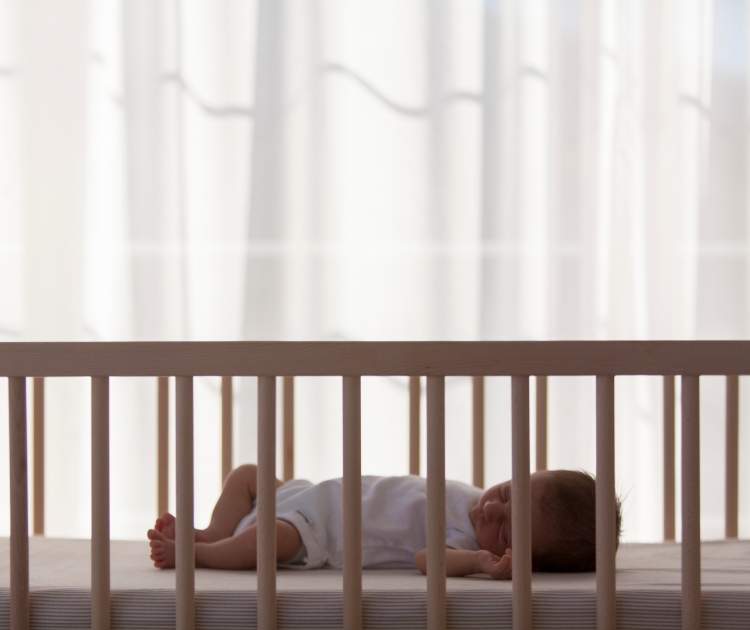Why does my baby wake up at 5:30 am and how to fix it?

My baby wakes up at night: what to do?
Waking at 5:30 AM, moody behavior... Why does baby wake up so early when the night seems barely started? Behind this early waking, multiple causes often hide: over-tiredness, environment disturbed by light or noise, or unbalanced nap schedule.
Discover in this article the key explanations to identify the origin of this early waking, and concrete adjustments to avoid these very early morning wakings.
Why does your baby wake up at 5:30 in the morning?
? Key takeaways: Baby's early wakings at 5:30 AM often reveal over-tiredness, an unsuitable environment, or schedules that need adjustment. By optimizing total darkness, moving bedtime earlier, and promoting independent sleep, parents regain longer nights. Early wakings are often explained by poorly calibrated naps or morning light (80% of cases).
Your alarm is set for 7 AM, but your baby's is set for 5:30 AM... Every morning, it's the same story. Is your little one really getting enough sleep? Why do they wake up so early?
Waking at 5:30 AM is common in babies aged 4 months to 3 years. This phenomenon can be explained by several reasons. Generally, it's not due to a vital need, but rather to poor sleep organization. Your baby is probably too tired, their sleep environment is unsuitable (too much light, disturbing noises), or their sleep habits aren't yet well established.
Know that this situation is very common and there are concrete solutions to help you enjoy more peaceful mornings. In the following lines, we'll first explore the main reasons for these early wakings, then share effective techniques to extend their nights, and finally, we'll see when it's better to consult a professional to be sure everything is fine.

The 5 main reasons explaining early morning wakings

Over-tiredness: the "too tired to sleep well" trap
Wondering why baby wakes at 5:30 AM? Over-tiredness is often the cause. When a baby stays awake too long, their body produces cortisol, a stress hormone that keeps them awake. This vicious cycle prevents restorative sleep.
The signs of over-tiredness are telling: crying at bedtime, early wakings, irritability after a short nap. An over-tired baby may even get a "second wind" at bedtime, appearing overexcited when they're actually exhausted. Exceeding age-appropriate wake windows also triggers adrenaline, another biological stimulant.
The sleep environment: light and noise, morning's false friends
The slightest ray of light can explain why baby wakes at 5:30 AM. Light blocks melatonin production, the sleep hormone. Even a subtle dawn can send their brain the signal "it's time to get up".
Morning noises also play a role. The neighbor's rooster, a passing car, or even your morning shower are enough to disturb their light sleep. For uninterrupted sleep, a calming room with blackout curtains is recommended.


The rhythm of naps and biological clock
A poorly timed nap disrupts baby's sleep. A nap that's too late, after 4 PM, shifts their internal clock. Their brain gets used to being awake at night and rested during the day.
Late and long naps shorten the night and decrease sleep pressure. Restorative sleep, concentrated before midnight, is sacrificed. To avoid this, consult our guide to organize a typical day for baby.
Hunger: a less frequent cause with age
Why does baby wake up at 5:30 AM? Hunger can explain early wakings, especially in infants. But after 6 months, a balanced evening meal is enough to last through the night.
Check that daytime intake is sufficient. A substantial dinner, rich in starches and proteins, keeps them satisfied longer. However, avoid heavy meals that would disturb their sleep.


Baby's major developmental stages
Early wakings can also signal a developmental leap. Learning to walk, language development, or separation anxiety generate increased brain activity.
These stages, though disruptive, are temporary. Your baby will learn to sleep peacefully again. Rest assured, this early morning waking is just a passing phase.
Our concrete solutions to help baby sleep longer
Creating a true \"sleep bubble\"
Creating a sleep-friendly environment in the baby's room is essential. Choose blackout curtains that block all external light, including dawn. Test it by turning on a lamp or night light: if light filters through, add fabric or aluminum foil.
- Install 100% blackout curtains to eliminate all light sources.
- Use low-volume white noise (e.g., fan, soft rain) to mask household sounds.
- Regulate the baby's room temperature between 18 and 20°C with a sleeping bag suitable for the season.
- Avoid stimulating toys or mobiles in the crib.
Place white noise far from the crib and at minimum volume to protect baby's hearing. A fan is often sufficient in the first months.
Creating a true \"sleep bubble\"
Move bedtime earlier in 15-minute increments, between 6 PM and 8 PM depending on age. A late bedtime activates cortisol, disrupting sleep. Hours before midnight are more restorative.
A clear routine (bath, lullaby, cuddle) sends consistent signals. For older children, a visual wake clock indicates when to leave bed. Maintain this consistency for 2 weeks to establish the new habit.
Adopting the right response to 5:30 AM wakings
Wait 5 to 10 minutes before intervening: baby might fall back asleep alone. If necessary, act in darkness with minimal words. Avoid taking them out or playing, which would reinforce the habit.
For 18 months+, a light-up clock changes color at 6:30 AM, indicating wake time. If baby is hungry, feed them without light or discussion, then put them back down. Apply this routine daily.
Promoting independent sleep
A baby who falls asleep alone is more likely to fall back asleep alone. Put them down awake but drowsy so they recognize their sleep cues (yawning, eye rubbing). This reinforces the importance of sleeping in their bed and develops soothing reflexes (pacifier, thumb sucking). From 3 months, gentle methods help structure this learning.
Is my baby naturally an "early bird" or lacking sleep?
A 5:30 AM wake-up seems premature for a child, but we must distinguish between two very different scenarios. Knowing how to recognize signs of fatigue or a peaceful awakening allows for effective action.
Signs of a tired baby vs a well-rested baby
To identify if your child lacks sleep, observe their behavior after waking and throughout the day. An exhausted baby will show these signs:
- Signs of sleep deprivation: crying upon waking, rubbing eyes, frequent yawning, daytime irritability, consistently falling asleep in the car.
- Signs of a well-rested early riser: coos and plays calmly in their crib, is smiling and in good mood, is energetic until naptime.
These signs help understand if early wakings come from a real need for more sleep or a natural biological rhythm. However, be careful: a grumpy baby in the morning is often accumulating sleep debt.
Adapting expectations to your child
If your baby wakes up happily before 6 AM, the goal is no longer to force them to sleep longer. Offer calm activities from wake-up, like gentle developmental games or nursery rhymes. This avoids disturbing your own rest while stimulating autonomy.
For children aged 2 to 3 years, an educational wake clock with visual day/night indication becomes useful. This device teaches them to recognize rest times and limits early wakings. It's also a practical solution for structuring the day without frustration.
5:30 AM wakings: when should you worry and consult?
Patience remains essential, but certain signals should alert you.
- Painful wakings (regurgitation, crying during feeds) or persistent reflux, often accompanied by sleep disturbances.
- Insufficient weight gain or growth curve break, revealing concerning growth.
- Failure of classic advice and parental exhaustion difficult to manage, affecting household serenity.
A pediatrician will evaluate medical causes (allergies, reflux, digestive issues) or refer to a sleep specialist.

Since 2023, home help services exist for overwhelmed parents. Your responsiveness can prevent long-term problems. Each child is unique, and seeking early consultation is never a failure: it's a proactive step for their future well-being.
Baby's early wakings at 5:30 AM are common and linked to over-tiredness, an unsuitable environment, or habits that need adjustment.
Optimize their room (darkness, white noise), move bedtime earlier, and promote independent sleep. If this isn't enough, consult a professional. With patience, each family finds its balance.













 What Age for Bunk Bed: Standards and Safety
What Age for Bunk Bed: Standards and Safety
 When to put baby in their room: age and transition
When to put baby in their room: age and transition
 Best Choice for Baby: Bed Attached to Parents or Next to Them?
Best Choice for Baby: Bed Attached to Parents or Next to Them?
 The convertible bed: furniture that grows with your child
The convertible bed: furniture that grows with your child
 The bunk bed with storage and desk: discover its advantages!
The bunk bed with storage and desk: discover its advantages!